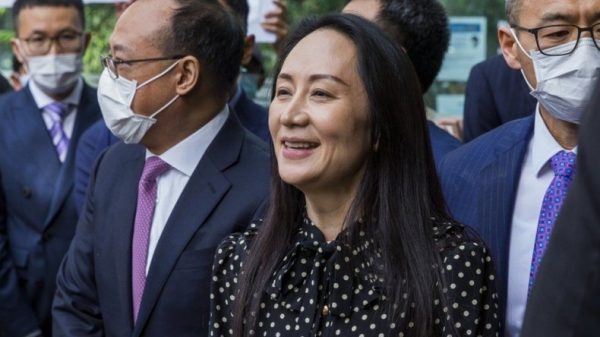Huawei top official Meng Wanzhou released in Canada

- Update Time : Saturday, September 25, 2021
- 161 Time View

A bitter diplomatic spat between Canada, China and the United States drew to a close on Friday, as Ottawa released Huawei executive Meng Wanzhou, and Beijing freed two Canadians who have been held in what critics call ‘hostage diplomacy.’
Meng and the two Canadians — former diplomat Michael Kovrig and businessman Michael Spavor — are all on their way back to their home countries after years of being detained.
Meng, the 49-year-old daughter of Ren Zhengfei, the billionaire founder of Chinese telecoms equipment supplier Huawei, was granted release in a Vancouver court hearing after three years of house arrest in Canada while fighting extradition to the United States.
This came hours after US prosecutors announced an agreement in New York under which fraud charges against her are to be suspended and eventually dropped.
She then quickly boarded a flight to the city of Shenzhen, returning to China for the first time since her arrest at Vancouver’s international airport at the behest of US authorities on December 1, 2018.
Canadian prime minister Justin Trudeau soon after announced that Kovrig and Spavor had ‘left Chinese airspace, and they’re on their way home.’
Their plane was expected to land Saturday in Canada, he told a news conference in Ottawa.
‘These two men have gone through an unbelievably difficult ordeal,’ Trudeau said.
‘For the past 1,000 days, they have shown strength, perseverance, resilience, and grace,’ he said. ‘And we are all inspired by that.’
Ottawa contends the pair were ‘arbitrarily’ arrested and imprisoned on ‘trumped up’ espionage charges in the days after Meng was detained, while Beijing has called Meng’s case ‘a purely political incident.’
In a statement, US secretary of state Antony Blinken said ‘the US Government stands with the international community in welcoming the decision’ to release the men ‘after more than two-and-a-half years of arbitrary detention.’
Kovrig’s employer Crisis Group also welcomed the ‘most just decision.’
Speaking to reporters after the court hearing in Vancouver before she headed to China, Meng said: ‘Over the past three years, my life has been turned upside down. It was a disruptive time for me as a mother, wife and a company executive.’
‘But I believe every cloud has a silver lining. It really was an invaluable experience in my life,’ she said.
‘The saying goes, the greater the difficulty, the greater the growth.’
The resolution of the case removes a deep thorn in the relationship between Beijing, Washington and Ottawa, with China accusing the United States of a political attack on one of its technology titans.
Beijing meanwhile accused Ottawa of doing Washington’s bidding by arresting and holding Meng, who was known inside Huawei as the ‘princess’ of the company and its possible future leader.
The United States had accused her of fraud against HSBC bank and wire fraud, saying she tried to hide violations of US sanctions on Iran by Huawei affiliate Skycom.
Washington says Huawei routed Skycom-linked payments through the US banking system, tying it to the sanctions violations, while Meng had served on the Skycom board.
But on Friday, US prosecutors settled for Meng agreeing to a statement of facts in the case.
In exchange, they agreed to defer the charges — which carried the risk of up to 30 years in prison — until December 1, 2022, and then drop them if Meng abides by the terms of the agreement.
‘In entering into the deferred prosecution agreement, Meng has taken responsibility for her principal role in perpetrating a scheme to defraud a global financial institution,’ acting US Attorney Nicole Boeckmann said in a statement.
‘Meng’s admissions are evidence of a consistent pattern of deception to violate US law,’ said FBI Assistant Director Alan Kohler.
The charges and Meng’s arrest were enmeshed in a broader campaign against Huawei, a private firm that Washington says is closely tied to the Chinese government and People’s Liberation Army.
US officials say Huawei’s phones, routers and switching equipment, used widely around the world, offer Chinese intelligence a potent backdoor into global communications.
US government agencies are banned from buying Huawei equipment, and Washington has pressured allies to follow suit.
But Beijing said the US attack is driven by politics and a desire to harm Chinese economic power.
Caught in between, Ottawa sought to rally allies, including Washington, to hike pressure on Beijing to release the ‘two Michaels’, who were held for nearly three years.
Both were put on trial in March this year. In August, Spavor was sentenced to 11 years in prison, while there had been no decision in Kovrig’s case.
Former Canadian ambassador to China, Guy Saint-Jacques, told AFP the release of Kovrig and Spavor coinciding with Meng being freed ‘does confirm that this was hostage diplomacy.’
It also means ‘one less thorn’ in the bilateral relationship, he said, but added that Canada-China ties likely ‘won’t come back to what they were before.’















